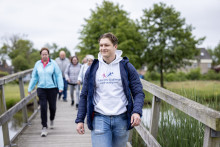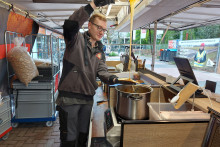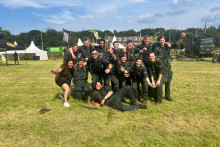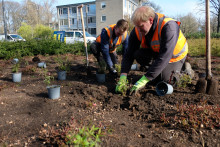Developing yourself outside the lecture halls - that is something many UT students enjoy: a board year, committee work, a student team, an internship abroad... Lars Oomkes opted for something different last year, just before starting his master’s project. ‘I’d been stuck at home sitting behind my laptop for a good part of my studies due to COVID-19, and at some point I thought: am I even ready to start working? Health Sciences is a great programme aimed at improving healthcare. But I was still unsure about how to put it into practice.’
By chance, Oomkes stumbled upon the National Diabetes Challenge, organised by the foundation of former professional volleyball player Bas van de Goor and promoted in the region by the organisation Twentse Koers. The aim is to get people moving. Oomkes, who lives in Lonneker, heard that they were in need of a group leader in the neighbouring town of Losser.
Leaps and bounds
He put up a few flyers at the GP’s office, and before long, he was in charge of a group of eight people. ‘People who - with all due respect - were not the fittest and were struggling with diabetes or pre-diabetes, high blood pressure or simply had difficulty exercising. We started at the local athletics track, but the first participant gave up after only half a lap. I didn’t really have any coaching experience, but I did want to motivate the group. I drew a line on the ground with a piece of chalk, so that the following week we could walk further than those two hundred metres.’
By literally making strides each week, the participants improved by leaps and bounds. Those first tiresome two hundred metres turned into 6.2 kilometres six months later. And on top of that, there were positive health effects, says Oomkes. ‘One participant lost 20 kilos in six months. And a few other participants could cut back their diabetes medication intake by 75 per cent.’ Moreover, it helped participants break out of their social isolation, he says. ‘At one point, an 87-year-old man joined the group, a two-time widower. The social aspect was also very important; we always drank a cup of coffee together afterwards. And we still do.’

‘I’m just Lars’
Because last May, Oomkes started a new group. With new challenges. ‘We’re now with seventeen people, including five from last year’s group. That makes it a bit harder to divide the attention, not to mention the difference in the participants’ fitness levels. But we have a WhatsApp group in which I share videos, for example, and this year, the Bas van de Goor Foundation shared a programme book containing exercises. That provides a bit more guidance.’
Oomkes also reached out to a few professionals. ‘A physiotherapist, podiatrist and a community sports coach have previously joined our walks,’ he says. They were able to help participants with tips on health and what sports are available in the area.’ Because the ideal scenario is for people to keep exercising, even after the National Diabetes Challenge. ‘When I was diagnosed with type 1 diabetes at the age of sixteen and heard about the possible complications, I decided that I had to stay on top of this. I started exercising a lot, mainly fitness. There are more than forty factors that affect your blood sugar levels, but by practising sports and exercising you can control all of that much better. I don’t want to let it rule my life too much. I’m just Lars.’
Interesting turn
Thanks to this little side-step from his studies, his life took an interesting turn. UT alumna in Health Sciences Elise Hol, director at Twentse Koers, joined in on one of his walks. Before he knew it, he had landed a final master’s project there. He has also been working at the healthcare organisation since August. Although Oomkes had been busy with his thesis in the months prior to that, he faithfully kept walking with the group every Friday morning. ‘Sometimes I had to motivate myself beforehand to maintain discipline. But afterwards, I’d always go home with a smile; every single time.’
It would be a good idea to start a similar initiative at the UT, thinks the new alumnus. ‘I’ve already discussed this with people from physiotherapy practice Topvorm Twente. The ambition for such a walking group is there, but it would have to be facilitated. And why not? There are many students who don’t feel like they belong in a team or performance sport and stay at home instead - maybe feeling lonely. So why not come for a walk? It’s easy and fun.’






